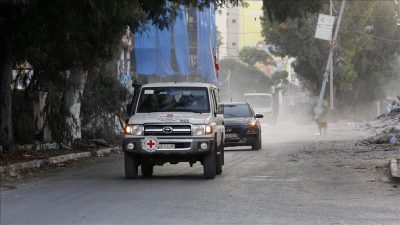Red Cross Says Situation in Gaza ‘Catastrophic’ as Fuel Lack Turns Hospitals Into Graves
International Federation of Red Cross and the Red Crescent Societies appeals for allowing entry of fuel into Gaza

All Global Research articles can be read in 51 languages by activating the Translate Website button below the author’s name.
To receive Global Research’s Daily Newsletter (selected articles), click here.
Click the share button above to email/forward this article to your friends and colleagues. Follow us on Instagram and Twitter and subscribe to our Telegram Channel. Feel free to repost and share widely Global Research articles.
***
The International Federation of the Red Cross and the Red Crescent Societies (IFRC) on Friday described the situation in Gaza as “catastrophic” as the lack of fuel, it said, would turn the hospitals into graves.
“The humanitarian situation in Gaza is more than catastrophic in the light of 12 hospitals and 32 healthcare centers becoming out of service due to lack of fuel or being bombed,” Mey Sayegh, head of IFRC communications, told Anadolu.
She added that the amount of aid that has entered Gaza since late last week, when Israel started letting in a trickle of aid trucks, does not even meet 4% of the needs of the people of Gaza.
She warned that Gaza has been without drinkable water and electricity for three weeks, and Palestinians each are getting per day an average of one to three liters of water, far away from the UN declared average of 15 liters per day for each person in times of catastrophes.
Sayegh also warned that the lack of fuel in Gaza would affect the security of water for people, might lead to diseases and epidemics, and would affect the humanitarian operations across Gaza.
“We, as IFRC, which is comprised of 191 Red Cross and Red Crescent societies worldwide have appealed since the start of the conflict to the necessity of allowing fuel entry into Gaza,” the IFRC official said.
Sayegh also called for protecting the civilians who deliver the humanitarian aid, as she said four staff from the Palestinian Red Crescent Society were killed while on duty.
The conflict in Gaza began when the Palestinian group Hamas initiated Operation Al-Aqsa Flood – a multi-pronged surprise attack on Oct. 7 that included a barrage of rocket launches and infiltrations into Israel by land, sea, and air.
Hamas said the incursion was in retaliation for the storming of the Al-Aqsa Mosque and growing violence by Israeli settlers against Palestinians.
The Israeli military then launched a relentless bombardment of Hamas targets in the Gaza Strip.
Over 8,700 people have been killed in the conflict, including at least 7,326 Palestinians and 1,400 Israelis.
*
Note to readers: Please click the share button above. Follow us on Instagram and Twitter and subscribe to our Telegram Channel. Feel free to repost and share widely Global Research articles.
Featured image: International Committee of the Red Cross (ICRC) vehicles transport Palestinians whose homes were destroyed in the attacks to safe areas (Source: AA)

